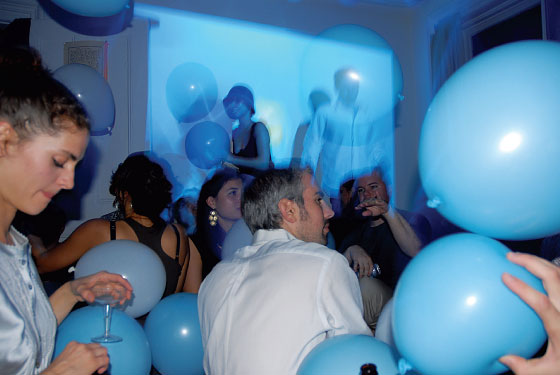
Last month, Porter Fox and Derek Loosvelt invited 75 people into Loosvelt’s Fort Greene brownstone. The party, a regular event called Salon Adelphi, included lots of booze, of course—but also an art installation by Jason Weatherspoon, a reading by writer Fiona Maazel, and a musical performance by indie singer Essie Jain. Guests went from room to room to watch the different acts, and at the end of the evening, the crowd (which at that point had swelled to over 200) spilled into the street, some lingering until 5 a.m. “Not since the days of the Beat Generation has there been a real personalization of the arts,” says Fox. “Sure, we’re idealizing that. But we also wanted to host this thing with people drinking, screaming, and having this rowdy great old time.”
A growing number of culturally restless New Yorkers are cutting out the middleman and curating parties in their own apartments. Brian Jacobs, a 27-year-old musician living in Williamsburg, hosts small, invite-only salons that looks like a high-end Generation-Y talent show. “A little while ago,” he explains, “my roommate and I said to each other, ‘Look how many cool people we know.’ And it didn’t seem like everyone was aware of what everyone else was doing.” Melanie Flood, a photographer who periodically puts up art installations in her Clinton Hill apartment, researches artists online, sends invites over Facebook, then stocks her apartment with alcohol.
Literary critic Michael Warner hosts what could be thought of as the grown-up version of these Brooklyn affairs at his Chelsea apartment. His salons borrow from an impressive circle of friends, including the novelists Michael Cunningham and Stacey D’Erasmo and Once musician Glen Hansard. “We like to keep it informal and organic,” says Warner, who notes that another friend, John Cameron Mitchell, based his movie Shortbus partly on Warner’s salon (“though not the sex-salon parts”). “There was a feeling that a lot of the downtown Manhattan artist life and club life had been dying out,” he says. “So we were consciously trying to counteract the changing conditions.”
Fox thinks there will be even more salons popping up as the economy gets worse. “Everybody that comes always says, ‘I wish there was more of this.’ ”